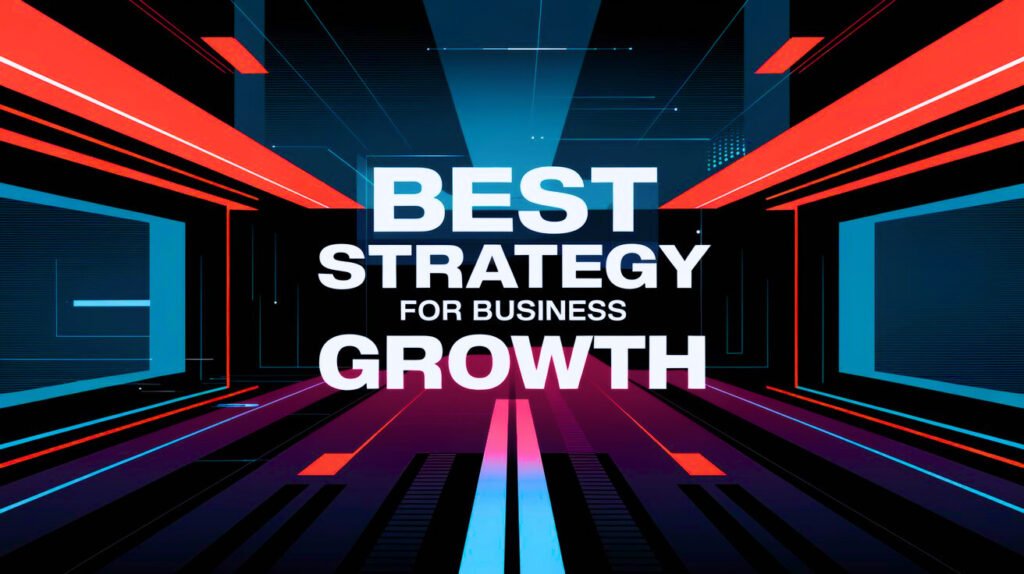Best Strategy For Business Growth Guide By Ravi Singh Rajput
Introduction
In today’s competitive landscape, crafting the best strategy for business growth is pivotal for any company striving to succeed. Businesses constantly search for effective growth and expansion methods, but achieving sustainable results requires useful planning, innovative thinking, and informed decision-making. Whether you are a small business owner or a seasoned entrepreneur, understanding the details of a business growth plan and executing it effectively is key.
This article will explore how businesses can leverage strategic frameworks such as growth marketing strategies, market expansion strategies, and business growth services to unlock potential and achieve measurable success.
Why Do Businesses Aim at Growth?
The search for growth is created in the DNA of any business. But why do businesses aim at growth? Growth provides opportunities to increase market share, enhance profitability, and build a resilient organization that can adapt to market changes.
For instance, market expansion is usually achieved by tapping into new customer segments or geographical regions. This approach often complements other types of business strategy, such as selection or partnership-based models. Companies like Amazon and Tesla exemplify how a focused expansion strategy can result in exponential success.
Understanding Growth Strategies
Types of Expansion Strategies
Business expansion is not a one-size-fits-all approach. Companies often use different types of expansion strategies depending on their objectives and resources.
- Organic Growth: Focusing on increasing output, enhancing sales, and improving efficiency. This is one of the core organic objectives of business.
- Inorganic Growth Strategies in Marketing: Includes mergers, Spending, or forming strategic alliances.
- Market Expansion Strategy: Entering new markets while leveraging existing products or services.
These strategies highlight how diverse approaches cater to unique business challenges.
How to Grow Your Business Online
In the digital age, one of the fastest ways to achieve business growth is through a robust online presence. Here are actionable tips:
1. Accept the Digital Revolution
Digital platforms offer immense potential for growth. Partnering with a business growth agency can provide businesses with the expertise to optimize their digital presence. Key areas to focus on include:
- Growth marketing strategy: Targeting specific customer segments with data-driven campaigns.
- Search Engine Optimization (SEO): Ensuring visibility in search engine results to attract organic traffic.
2. Innovative Ideas for Company Growth
Think beyond traditional marketing by adopting growth servicing strategies that include personalized email marketing, AI-driven customer engagement, and social commerce.
3. Growth Support Through Analytics
Measuring success is critical. A growth system built on analytics helps businesses understand what works, enabling informed decision-making for future strategies. After all, growth is measurable, and tracking data is pivotal for long-term results.
Strategic Partnerships and Collaboration
Collaboration is a proven way to growth. Strategic alliances or partnerships can be mutually beneficial for companies looking to expand their reach and capabilities. For example:
- Growth operations: Partnering with service providers to improve efficiency.
- Joint ventures as part of an external growth strategy to enter new markets.
The Role of a Business Growth Strategist
Hiring a business growth strategist or consulting with business growth experts can help identify growth opportunities that align with the company’s unique strengths.
Developing Growth Through Market Expansion
Market expansion is a powerful way to growth. The development of business policy around entering new regions or social often includes elements like:
Businesses like Uber and Airbnb have achieved international success by adopting adaptive market expansion strategies that cater to local needs.
The Role of Business Strategy for Small Business
For small businesses, limited resources demand precision in strategy. A business strategy for small business should focus on scalable growth ideas, such as:
- Niche marketing for a targeted audience.
- Partnerships with complementary brands.
- Investing in technology to automate processes.
Time Is Money: Expansion of the Idea
The saying “time is money” holds significant relevance when discussing business growth. Efficient use of time through automation and streamlined processes can directly contribute to higher profitability and quicker expansion.
Consider this: time is money expansion of idea can lead to improved operations and better customer service. Investing in tools and systems for faster decision-making is one of the most impactful ways to growth.
Future Plan: Long-Term Achievement
A robust future strategy ensures that growth remains sustainable. Businesses should adopt a long-term strategy focusing on adaptability, innovation, and continuous improvement.
Different types of business strategies—from differentiation to cost leadership—can be combined with growth servicing strategies to create a comprehensive plan that aligns with changing market dynamics.
Tips for Businessmen to Achieve Success
1. Have a Clear Vision and Goals
A clear vision serves as the foundation for your business. Set specific, measurable, achievable, relevant, and time-bound (SMART) goals to stay focused and track your progress.
Tip: Write down your vision and break it into short-term and long-term objectives. Revisit them regularly to ensure alignment with your business activities.
2. Understand Your Market
Stay informed about industry trends, customer preferences, and competitor strategies. Conduct regular market research to make informed decisions and stay ahead of the curve.
Tip: Use tools like Google Analytics, customer surveys, and competitor benchmarking to gather insights about your market.
3. Master Financial Management
Effective financial management is crucial for business sustainability. Monitor cash flow, maintain a budget, and plan for contingencies.
Tip: Consider working with a financial advisor or accountant to ensure your business’s financial health.
4. Focus on Customer Experience
Your customers are the backbone of your business. Prioritize exceptional service, seek feedback, and continuously improve to meet their expectations.
Tip: Implement a CRM (Customer Relationship Management) system to track interactions and enhance customer engagement.
5. Build a Strong Team
Cover yourself with skilled, motivated individuals who share your vision. Empower your team through trust, training, and opportunities for growth.
Tip: Create a culture of transparency and collaboration to foster loyalty and productivity.
6. Use Technology
Incorporate modern tools and technology to streamline operations, improve efficiency, and reach a broader audience.
Tip: Invest in automation software, digital marketing tools, and e-commerce platforms to enhance your business capabilities.
7. Adapt to Change
The business world is dynamic, and adaptability is key to survival. Stay flexible, embrace innovation, and be willing to pivot your strategy when necessary.
Tip: Follow industry blogs, attend workshops, and network with peers to stay updated on emerging trends.
8. Give Networking Importance
Building strong relationships with other professionals, suppliers, and customers can open doors to new opportunities.
Tip: Attend industry events, join business forums, and actively engage on professional platforms like LinkedIn.
9. Keep Learning
Continuous learning helps you stay competitive and informed. Enroll in courses, read books, and learn from mentors to enhance your skills.
Tip: Focus on areas such as leadership, marketing, financial planning, and negotiation.
10. Take Calculated Risks
Risk is inherent in business, but it’s important to assess potential outcomes and plan accordingly. Be bold but calculated in your decision-making.
Tip: Conduct a SWOT analysis (Strengths, Weaknesses, Opportunities, Threats) before making major business moves.
11. Monitor Performance
Regularly evaluate the performance of your business through key performance indicators (KPIs). Identify areas of improvement and adjust your strategies accordingly.
Tip: Use analytics tools to measure metrics like sales, customer satisfaction, and operational efficiency.
12. Maintain Work-Life Balance
Success in business should not come at the cost of your health or personal life. Take time to recharge and maintain balance.
Tip: Delegate responsibilities and schedule downtime to avoid burnout.
13. Seek Expert Advice
Don’t hesitate to consult with business advisors, mentors, or growth strategists. They can offer valuable insights and guidance based on their experience.
Tip: Join a strategic growth forum or local business association to access expert resources and advice.
14. Be Resilient
Setbacks are part of the journey. Stay resilient and persistent, learn from failures, and keep moving forward.
Tip: Focus on solutions rather than problems, and maintain a positive outlook during challenging times.
Conclusion
Achieving the best strategy for business growth requires a combination of innovative thinking, strategic planning, and effective execution. Whether it’s through market expansion strategies, partnering with a business growth agency, or leveraging digital platforms, businesses must remain agile and customer-focused.
Incorporating proven growth ideas, like collaboration, data-driven marketing, and efficiency improvements, can propel any company toward long-term success. Remember, growth is measurable and achievable when businesses prioritize adaptability and invest in strategies that align with their core objectives.
By understanding the unique challenges and opportunities of your business and collaborating with experts, you can create a business growth plan that delivers impactful results for the growing company.





Pingback: Best Business Problem-Solving Techniques For Startups